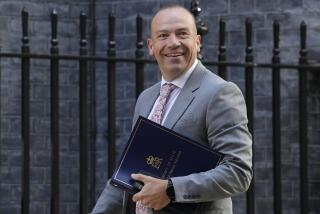Peace Process in N. Ireland
- Share via
In his Feb. 18 commentary on Northern Ireland, Alexander Cockburn presents a factually incorrect and one-sided account of recent events. The Good Friday agreement has been a great success. Most of it has been or is being implemented. This includes reform of the police force, the establishment of human rights and equality commissions, the early release of 313 of 425 prisoners convicted of serious crimes, the closure of 26 army and police bases and the redeployment of 2,000 troops to the mainland.
By the end of last year, only two parts of the Good Friday agreement remained to be addressed: the setting up of an executive body and the start of the decommissioning of weapons by the Irish Republican Army and other paramilitary groups. With the help of [U.S. envoy] George Mitchell, a compromise over the sequencing of these aspects was reached involving the formation of the executive in the context of a widespread expectation that the IRA would begin to decommission its weapons. It did not. As a result, confidence between the parties has once again broken down. We suspended the new political institutions to prevent their collapse. We, with the Irish government, are now working to restore the trust between the parties that produced so much progress over the last two years.
PAUL DIMOND
British Consul General
Los Angeles
*
A peace in which one side has to lay down its arms and the other side can stay armed would never work. That’s what the IRA was asked to do. The Royal Ulster Constabulary could stay armed. Here’s a peace plan that would work because both sides want peace. The IRA and RUC lay down their guns at the same time.
EILEEN MURPHY
Huntington Beach
More to Read
Sign up for Essential California
The most important California stories and recommendations in your inbox every morning.
You may occasionally receive promotional content from the Los Angeles Times.













